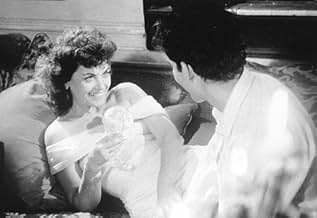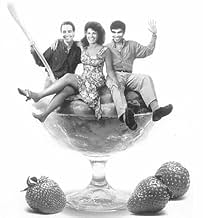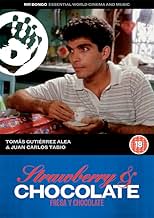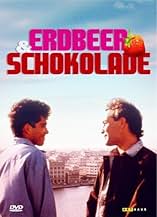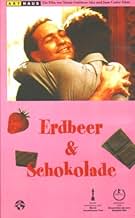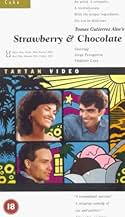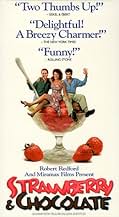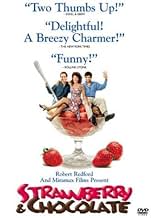AVALIAÇÃO DA IMDb
7,4/10
6,2 mil
SUA AVALIAÇÃO
Estudante cubano que acredita firmemente no regime de Fidel Castro entra em depressão quando sua namorada o deixa para casar-se com outro. Sua vida toma outro rumo quando conhece Diego, arti... Ler tudoEstudante cubano que acredita firmemente no regime de Fidel Castro entra em depressão quando sua namorada o deixa para casar-se com outro. Sua vida toma outro rumo quando conhece Diego, artista homossexual que luta contra a discriminação.Estudante cubano que acredita firmemente no regime de Fidel Castro entra em depressão quando sua namorada o deixa para casar-se com outro. Sua vida toma outro rumo quando conhece Diego, artista homossexual que luta contra a discriminação.
- Direção
- Roteiristas
- Artistas
- Indicado a 1 Oscar
- 25 vitórias e 2 indicações no total
Avaliações em destaque
`Strawberry and Chocolate' (1993)is set in contemporary Havana. The luster of that city has dimmed after nearly four decades of Castro's rule. David (Vladimir Cruz), a student and avid Castro supporter, is on the rebound after losing his girlfriend. He had taken her to a cheap hotel to make love, but the place is so shabby it puts her off. Instead, he promises never to touch her until they marry. In the next scene, she marries someone else while David stands sullenly among the well wishers at the registry office. Then he meets Diego (Jorge Perugorría).
Diego, who is flamboyantly gay, parks himself at David's table in an outdoor café to eat a dish of strawberry ice cream. For David, this is suspicious because chocolate is also available. Diego says some people like chocolate, some like strawberry, an innocuous line that gives the movie its title and also hints at the odd couple relationship to follow.
Diego does not disguise his sexual interest in David, but is also interested in giving David an education the regime denies him. The older man is far more cultured than his new friend. Offers of books banned in Castro's Cuba, such as a novel by Mario Vargas Llosa or the poems of John Donne, lure David to his apartment for tea and talk. When David reports that Diego is involved with a forbidden art exhibit, he is directed to befriend Diego to find out more information. `Strawberry and Chocolate' thus sets their emerging friendship against the backdrop of two bleak themes: anti-gay prejudice in the Castro regime, and the betray-thy-neighbor expectation of a police state.
But almost nobody conforms to type. A woman in Diego's building who is part of the neighborhood Vigilance Committee, on the watch for counter-revolutionary activities, turns out to be a good friend to Diego and then to David. Everyone plays one game with the government, but a different one in their private lives. This is a lesson David has to learn. Encounters with women along the way provide a few subplots, but the heart of the story lies in the hearts of the two men.
`Strawberry and Chocolate' is credited to directors Tomás Gutiérrez Alea and Juan Carlos Tabío. The former was, until his death shortly after completing this film, the best known filmmaker in Cuba, winning an international reputation in the 1960's for titles such as `Memoirs of Underdevelopment,' a look at life in Cuba in the early Castro years that tempers criticism with prudence. `Strawberry' is smaller in scale and less overtly political.
The film was nominated for an Oscar in 1995 and won awards at film festivals around the world (including the Sundance Festival). American viewers may instantly slot it with Hollywood features that show how straight characters learn life lessons from a wiser gay companion (`Boys on the Side,' `As Good As It Gets'). And at times Diego's excesses recall the worst performances of Harvey Fierstein. Yet superb performances by the two male leads eventually move beyond stereotypes they and the audience initially share about each other, transforming their unexpected friendship into a statement that puts the lie to official groupthink in a repressive regime.
Diego, who is flamboyantly gay, parks himself at David's table in an outdoor café to eat a dish of strawberry ice cream. For David, this is suspicious because chocolate is also available. Diego says some people like chocolate, some like strawberry, an innocuous line that gives the movie its title and also hints at the odd couple relationship to follow.
Diego does not disguise his sexual interest in David, but is also interested in giving David an education the regime denies him. The older man is far more cultured than his new friend. Offers of books banned in Castro's Cuba, such as a novel by Mario Vargas Llosa or the poems of John Donne, lure David to his apartment for tea and talk. When David reports that Diego is involved with a forbidden art exhibit, he is directed to befriend Diego to find out more information. `Strawberry and Chocolate' thus sets their emerging friendship against the backdrop of two bleak themes: anti-gay prejudice in the Castro regime, and the betray-thy-neighbor expectation of a police state.
But almost nobody conforms to type. A woman in Diego's building who is part of the neighborhood Vigilance Committee, on the watch for counter-revolutionary activities, turns out to be a good friend to Diego and then to David. Everyone plays one game with the government, but a different one in their private lives. This is a lesson David has to learn. Encounters with women along the way provide a few subplots, but the heart of the story lies in the hearts of the two men.
`Strawberry and Chocolate' is credited to directors Tomás Gutiérrez Alea and Juan Carlos Tabío. The former was, until his death shortly after completing this film, the best known filmmaker in Cuba, winning an international reputation in the 1960's for titles such as `Memoirs of Underdevelopment,' a look at life in Cuba in the early Castro years that tempers criticism with prudence. `Strawberry' is smaller in scale and less overtly political.
The film was nominated for an Oscar in 1995 and won awards at film festivals around the world (including the Sundance Festival). American viewers may instantly slot it with Hollywood features that show how straight characters learn life lessons from a wiser gay companion (`Boys on the Side,' `As Good As It Gets'). And at times Diego's excesses recall the worst performances of Harvey Fierstein. Yet superb performances by the two male leads eventually move beyond stereotypes they and the audience initially share about each other, transforming their unexpected friendship into a statement that puts the lie to official groupthink in a repressive regime.
10Scoval71
The comment from the viewer in Norway who had to be forced to watch this lovely film is in dire need of just more than learning to speak Spanish. This film is not about two gay men, as one character is gay, the other is straight. It is a movie about how two people who seem to be very different are really very similar. Both love their country and they learn that love of man (or of woman) and of country can be expressed differently and still be valued and respected. It is a wonderful, charming, endearing and thoroughly well acted movie. It is extremely realistic and gives and shows a snapshot of Cuba we are not able to see or partake of. I thoroughly enjoyed this movie. It is funny, well acted and well written and directed. The two male leads are superior as is the female character. I have seen this movie many times and never tire of it. I most highly recommend it. It is not a gay film, so don't think of it that way or you will be very disappointed.
one of films with status of experience. because it is a simple and precise pledge for discover the other. because it is a great friendship story. because it defines each totalitarian regime in its essence - especially Communism - in the right manner. and, not the last, for great performances. Jorge Perugorria is the fine example, his Diego being brilliant example of vulnerability, force and special form of wisdom. Vladimir Cruz, as the young man looking his sense/happiness, Galateea of a not ordinary Pygmalion, does an admirable work, too. and it is not fair to ignore Francisco Gattorno who has the chance to propose more than a character from the Latino soap opera area. "Fresa y chocolate" is one of films who must see twice. in strange way, for its beautiful simplicity. because it remains one of the most touching pledge for the courage to be yourself. and for the joy of life. and for authentic links between people. short, a real great film.
9B24
Any perceptive viewer of this film will recognize quickly what it does and does not represent. We can be easily misled by previews or trailers promising stereotypical characters or cheap thrills, designed only to attract attention. They can be a turn-off as well. In this case I was fortunate enough to get past the marketing and into what turned out to be a truly well-made and fascinating film of extraordinary literary dimensions.
First, it is a profoundly anti-fascist and anti-totalitarian tale. Internal references to famous Cuban writers and musicians frame every scene, while the players entertain us with character sketches involving such mundane things as romantic urges, kitsch as art, and ice cream. The action is fast-paced. One bit resolves itself into another with ease. Musical scoring and editing are appropriate in every way -- always a hallmark of any good film.
But it is great acting and great directing that put this one over the top into Oscar league contention. A true "must-see."
First, it is a profoundly anti-fascist and anti-totalitarian tale. Internal references to famous Cuban writers and musicians frame every scene, while the players entertain us with character sketches involving such mundane things as romantic urges, kitsch as art, and ice cream. The action is fast-paced. One bit resolves itself into another with ease. Musical scoring and editing are appropriate in every way -- always a hallmark of any good film.
But it is great acting and great directing that put this one over the top into Oscar league contention. A true "must-see."
This film isn't just an "odd couple" story, as it can appear at a first glance. This is a landmark Cuban film about the plight of homosexual artists in Communist Cuba. Being homosexual in Cuba in the 60's and 70's, maybe even the 80's, could mean incarceration or being sent to "colonies", often hard labour camps. What makes this film extraordinary is that it was made by a Cuban director who had been himself part of the Communist intelligenzia at the beginning, but could still be objective and therefore critical of the intolerance of real socialism. What also makes the film extraordinary is that the film itself was a box office success in Cuba and helped change attitudes towards homosexuality. Tomás Gutiérrez Alea, or Titón, as he was known in Cuba, is the greatest and best loved Cuban filmmaker, with a trademark black humour, best exemplified in his outstanding films Memorias del subdesarrollo (Memories of Underdevelopment) (1968) and La Muerte de un burócrata (Death of a Bureaucrat) (1966). His last film, Guantanamera (1994), which he made when ill with cancer, is a black comedy of "funeral" errors and criticism of Cuban bureaucracy. This is his legacy, the way he wanted his public to remember him, laughing at death.
Você sabia?
- CuriosidadesCuba's official submission to the Best Foreign Language Film category for the 67th Academy Awards. As of 2020, it remains the only Cuban film to be nominated for an Oscar.
- Erros de gravaçãoThe blue Cadillac seen at the end of the film was not made until the 1987 model year.
Principais escolhas
Faça login para avaliar e ver a lista de recomendações personalizadas
- How long is Strawberry & Chocolate?Fornecido pela Alexa
Detalhes
Bilheteria
- Faturamento bruto nos EUA e Canadá
- US$ 2.080.805
- Faturamento bruto mundial
- US$ 2.087.569
- Tempo de duração
- 1 h 48 min(108 min)
- Cor
- Mixagem de som
- Proporção
- 1.85 : 1
Contribua para esta página
Sugerir uma alteração ou adicionar conteúdo ausente

